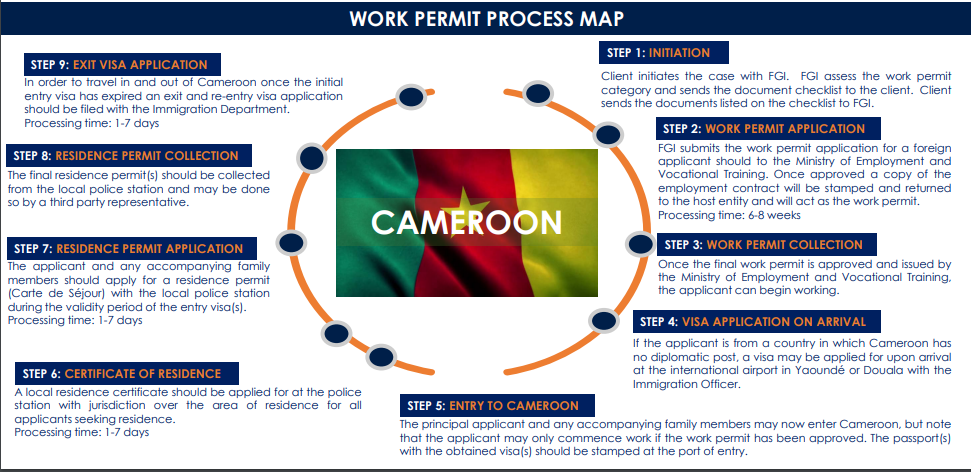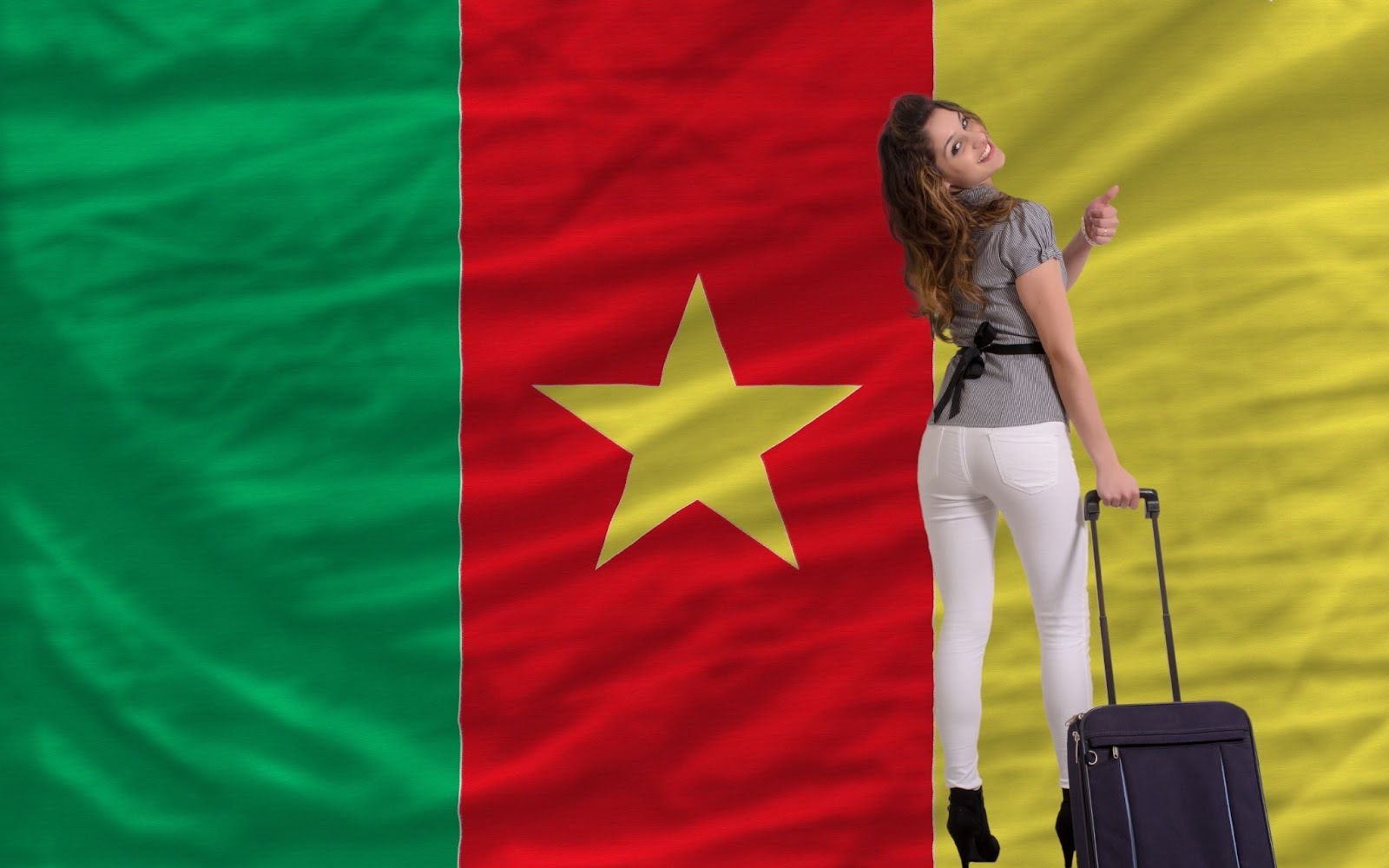Residency in Cameroon
Cameroon, often referred to as "Africa in Miniature," is a diverse and culturally rich country in Central Africa. Whether you're considering working, starting a business, or planning a long-term stay in this vibrant nation, understanding the residency and permit requirements is essential. In this blog, we'll break down the key aspects of securing a residency permit in Cameroon, including work permits, resident permits, and business permits.
Work Permit in Cameroon
Securing a work permit in Cameroon can be a complex process, especially for foreigners. Here's a step-by-step guide to help you navigate the requirements:

- Application Submission: Your journey begins by addressing your work permit application to the appropriate government ministry.
- Employment Contract: You must have an employment contract with a registered company in Cameroon. The employing company should be willing to sponsor your application. If not, it's your responsibility to find a sponsor within Cameroon.
- Professional Certificate: Include a copy of your professional certificate as proof of your qualifications.
- Medical Certificate: A medical certificate confirming your good health is a prerequisite.
- Entry Visa or Resident Permit: If you're already residing in Cameroon, provide a copy of your entry visa or resident permit.
- Company Profile: Attach a copy of the employing company's profile.
- Residence Certificate: Include a copy of your residence certificate.
- Statutory Payment: Make the necessary statutory payments as required by the government.
After ensuring that you've met these requirements, it's highly advisable to engage a local immigration attorney. They can help you schedule an appointment with the ministry, certify and notarize your documents, and submit your application. It's important to note that the ministry reserves the right to accept or reject your application.
Resident Permit for Immigration
Even Cameroonian citizens by birth are required to obtain a resident permit, and for foreign nationals, it's a must. Here's what you need to know:
- Application Submission: Begin by addressing your application for a resident permit to the immigration office.
- Residency Certificate: Include a copy of your residency certificate.
- Yellow Fever Card: Provide a copy of your yellow fever vaccination certificate.
- Employment Contract or Admission Letter: Include a copy of your employment contract or admission letter if applicable.
- 3-Month Entry Visa: Attach a copy of your 3-month entry visa in Cameroon.
- Tax/Revenue Receipt: Prove that you've paid the required taxes and revenue.
- Consular Card/Attestation of Membership: Include a consular card or an attestation of membership in the country union.
Business Permit
For those with business aspirations in Cameroon, obtaining a business permit is a necessity. Here are the documents you'll need:
- Residence Certificate: Include a copy of your residence certificate.
- 3-Month Entry Visa: Attach a copy of your 3-month entry visa.
- Company Taxpayer's Card: Provide the company's taxpayer card.
- Company Profile: Include a copy of the company's profile.
- Passport Data Page: Submit a copy of your passport data page.
- Application for a Business Permit: Complete the necessary application form.
Engaging the services of an immigration attorney is highly recommended for a smooth application process. They can assist with document submission and help you schedule an appointment for biometric data capture, fingerprinting, and signature. Initially, a temporary resident card will be issued, with the original permit arriving approximately three months later. Keep in mind that resident permits are typically valid for two years and must be renewed as required.
Relocating to Cameroon
Cameroon, often referred to as "Africa in Miniature," is a country of remarkable diversity, both in terms of its culture and geography. In this blog, we'll explore the essential aspects of Cameroon, from its vast landscape to its people and the practicalities of relocating to this intriguing nation.

The Land and Its People
- Geographical Diversity: Cameroon boasts an extensive land area, covering more than 475,000 square kilometers. It shares borders with Nigeria, Chad, Central African Republic, Equatorial Guinea, Gabon, and Congo. Its coastline kisses the Atlantic Ocean at the Bight of Bonny.
- Population: With approximately 22.25 million residents, Cameroon's population is evenly distributed between rural and urban areas. Major cities like Douala, Yaoundé, and Garoua are bustling hubs of activity.
- Languages: One of Cameroon's most remarkable features is its linguistic diversity. More than 230 distinct languages are spoken in this country. While French serves as the official language and is spoken by about 80% of the population, traditional tribal languages are equally significant. Among these, Baka and Bakoo stand out as prominent indigenous languages.
- Expatriate Community: Cameroon is known for its political and social stability in Central Africa, making it a magnet for expatriates. Nigerians constitute the largest group of foreign nationals, closely followed by Sudanese. Approximately 2% of the population consists of expats from outside Africa, with Europeans and Chinese being the most common.
The Climate in Cameroon
- Regional Climate Variations: Cameroon experiences a range of climates, primarily classified as tropical and semiarid. There are distinct variations between the northern and southern regions.
- Southern Regions: The southern and coastal areas are characterized by high humidity and heat. The dry season typically spans from November to February, with average temperatures reaching a toasty 32°C (89.6°F). In contrast, the rainy season arrives from August to October, bringing with it extremely heavy rainfall, particularly along the coast.
- Northern Region: The northern region offers a different climate, characterized by arid conditions. It's hot and dry, with a rainy season from May to September and an average temperature of 30°C (86°F).
Visas for Cameroon
Entry Requirements: Regardless of the duration of your stay in Cameroon, a valid visa is essential. Here are the key requirements:
- Visa Application: To secure a visa, you'll need to complete a visa application form. This form can typically be obtained and filled out online or in person at the nearest Cameroonian embassy or consulate.
- Passport Validity: Ensure that your passport has a minimum of six months' validity remaining from the date of your intended departure from Cameroon.
- Passport Photos: Submit two passport-sized photographs as part of your visa application.
- Yellow Fever Vaccination: A yellow fever vaccination certificate is a mandatory requirement for entry.
- Financial Proof: Present a recent bank statement that clearly displays your name, address, bank account balance, and complete transaction history.
Residence Visa: If your plan is to reside in Cameroon for more than three months, you must obtain a residence visa. The consulate imposes a residence permit fee, with the minimum amount set at 250,000 XFA, but prices may vary. For in-depth information and guidance on visa and residency requirements, it's advisable to visit a Cameroonian embassy.
FAQ
- What do you need for a residence permit in Cameroon?
To obtain a residence permit in Cameroon, you will need:
- A certified true copy of a valid passport, not more than 3 months old, bearing a long-stay visa.
- A certificate of residence, issued by the administrative authority or police in charge of territorial jurisdiction, bearing the prior and compulsory signature of the quarter head or village head.
- Can foreigners work in Cameroon?
Yes, foreigners, including those born in Cameroon, need a work visa and residence permit to work in the country. Hiring expatriates for your Cameroonian workforce involves a multifaceted process and may attract additional fees. Compliance with employment and immigration laws is essential to legally employ foreigners in Cameroon.
- How long can I stay in Cameroon as a tourist?
Tourists in Cameroon with an e-visa can stay in the country for up to 90 days per visit. E-visas for tourism are available as either short or long-stay visas. It's important to consider your itinerary and how frequently you wish to visit before submitting your visa application.
- How much is a residence permit in Cameroon?
The minimum payment for a residence permit in Cameroon is 250,000 Central African CFA Francs (F CFA). Visitors planning to stay in Cameroon for longer than 3 months should obtain a residence permit from DGSN. It's crucial to ensure you have a valid visa covering the entire duration of your stay, as the penalty for overstaying a visa is 20,000F CFA per day.
- How can I get a Cameroon visa from India?
As an Indian national, you can apply for a Cameroon tourist visa by submitting your application to the appropriate embassy or consulate. Be sure to verify the specific requirements for the embassy or consulate you are applying through. After submitting your application, you will need to wait for it to be processed.
Applying for a Cameroon eVisa
- Step 1: Complete the online application form with your personal details and passport information.
- Step 2: Proceed to securely pay online using your credit card.
- Step 3: Check your email for payment confirmation and receipt of your Cameroon eVisa, which will be sent electronically.

